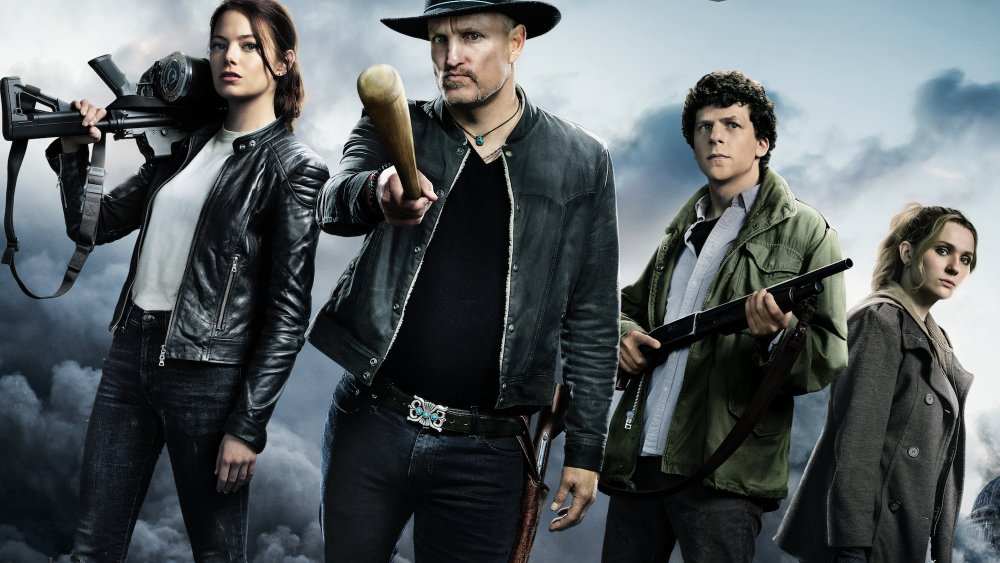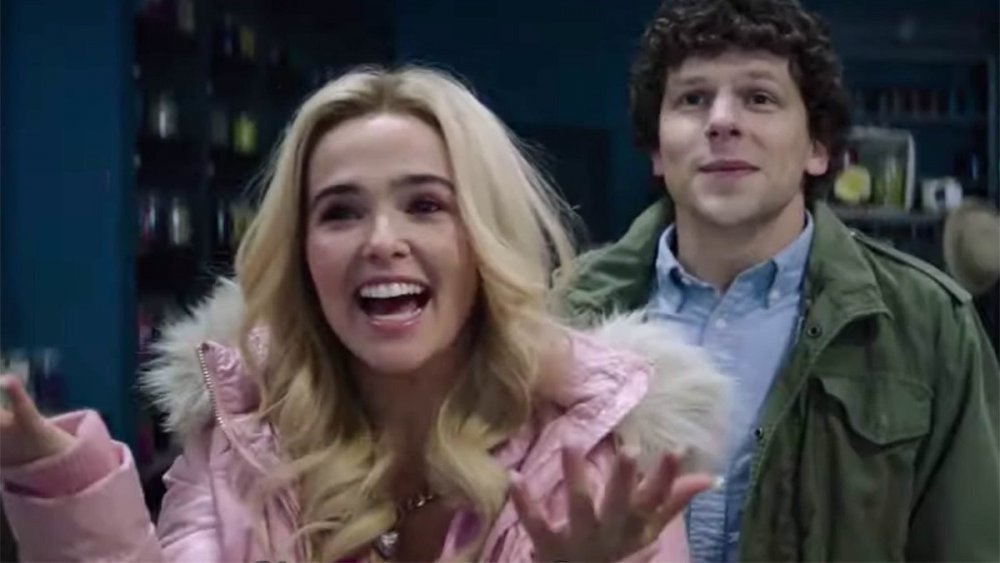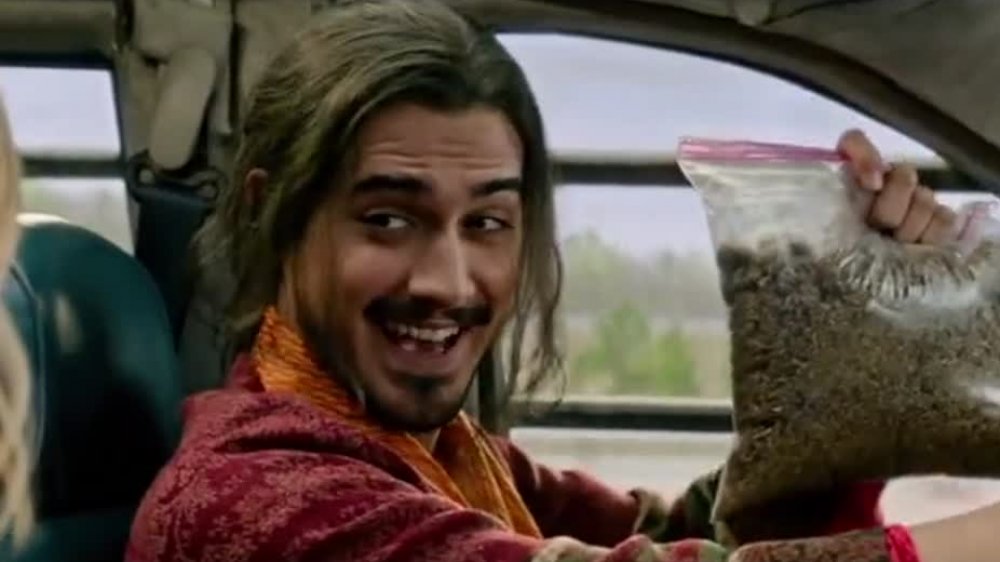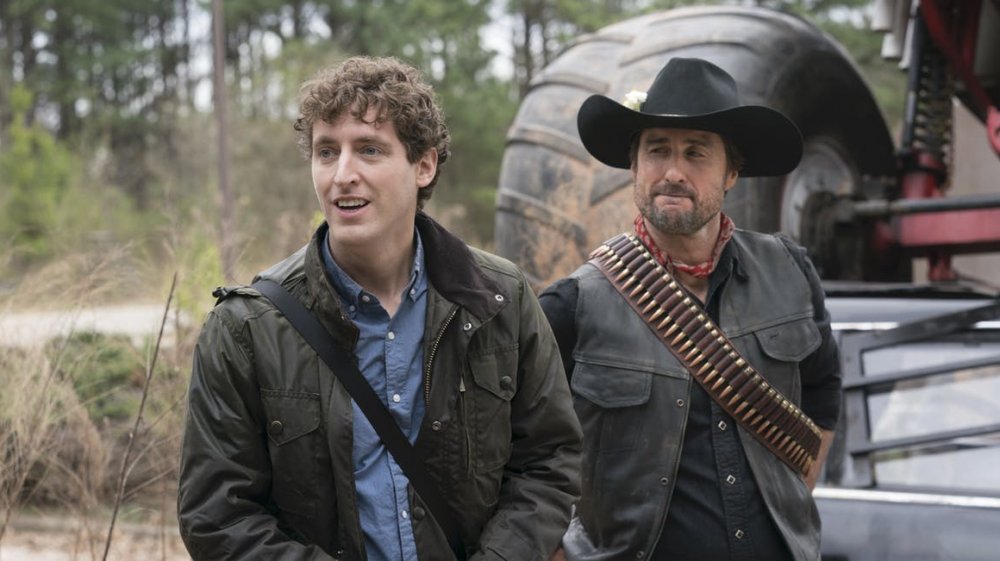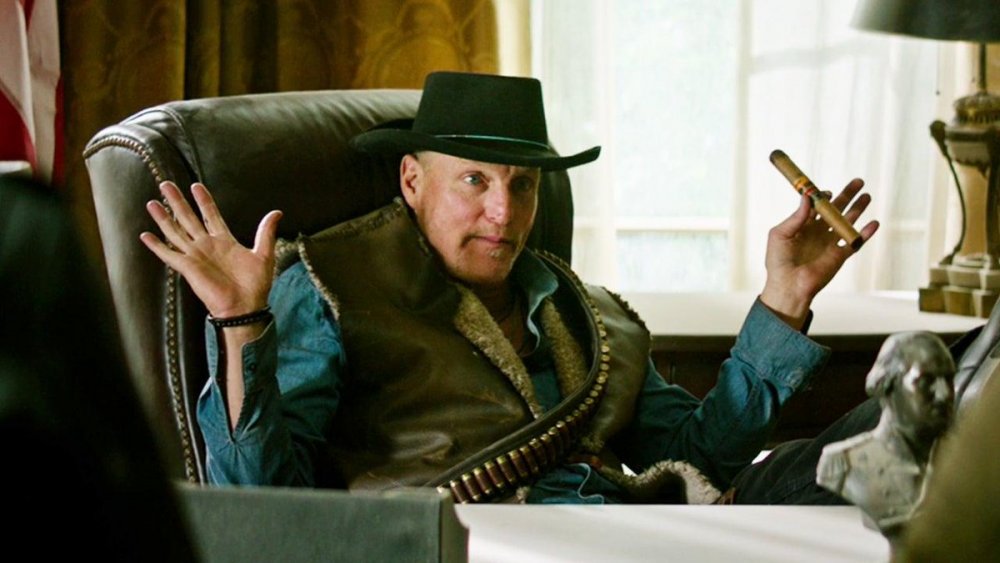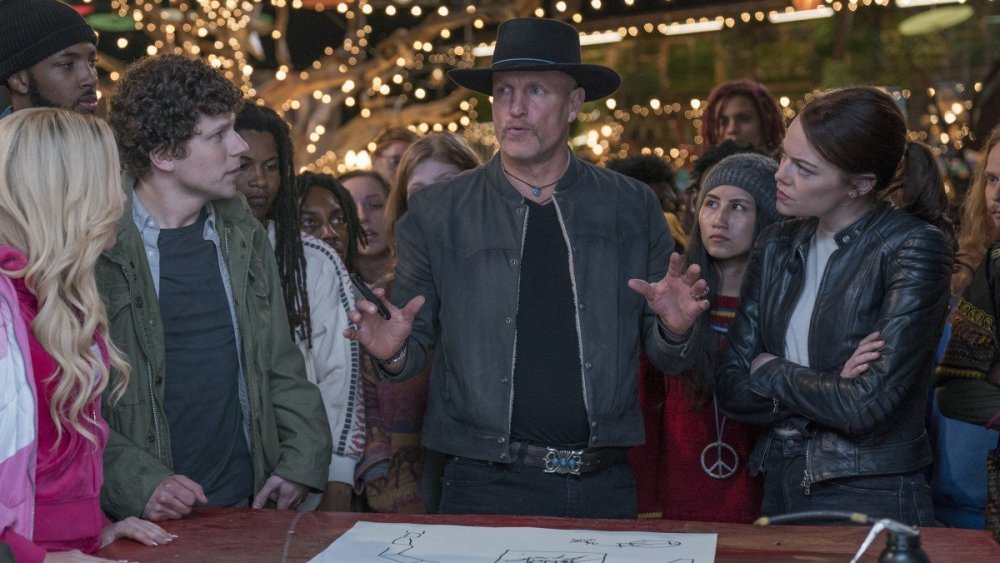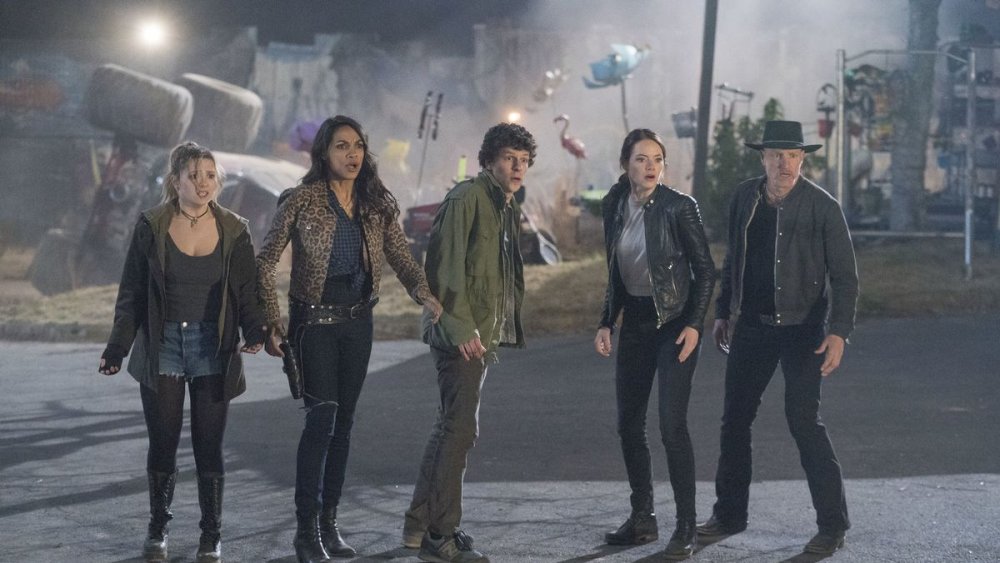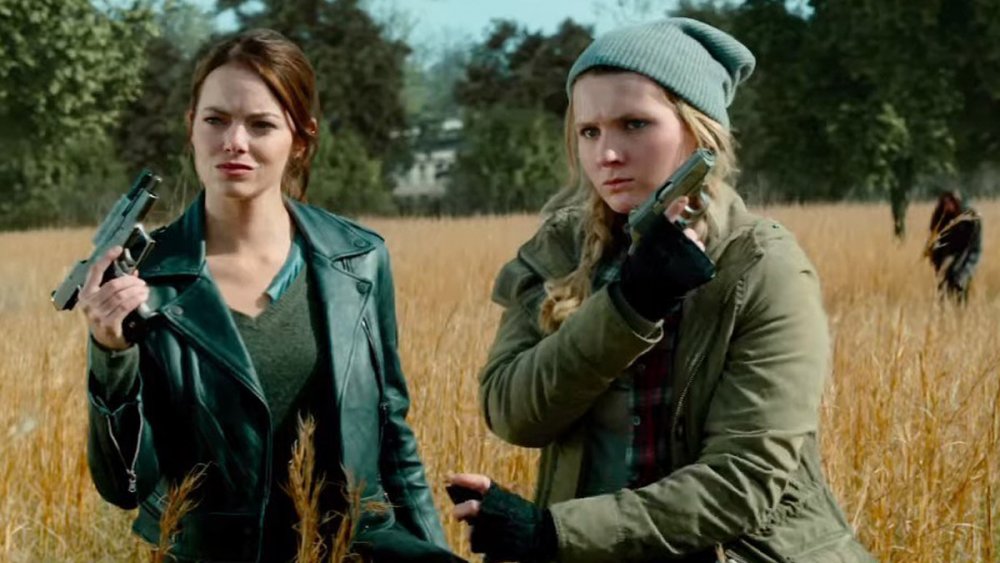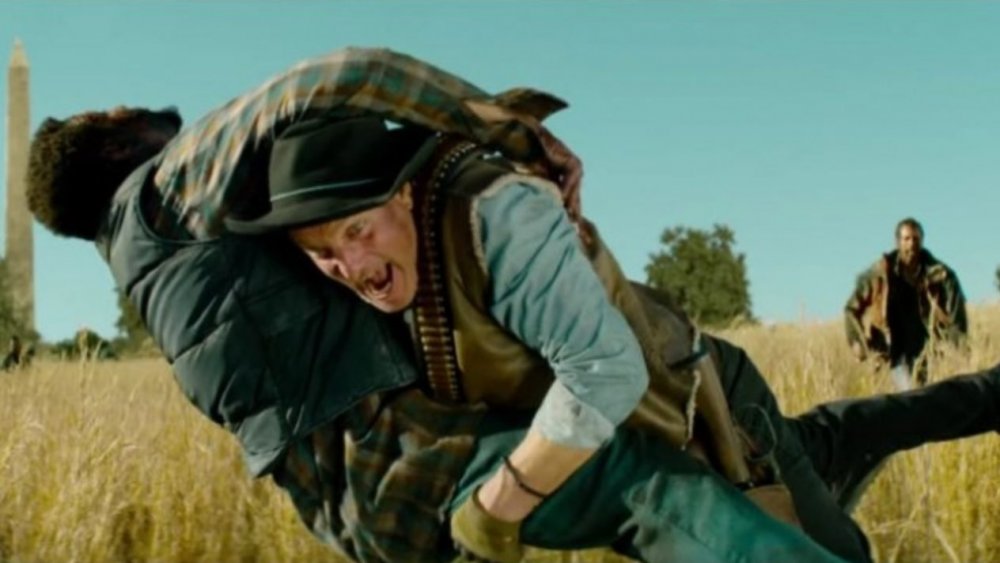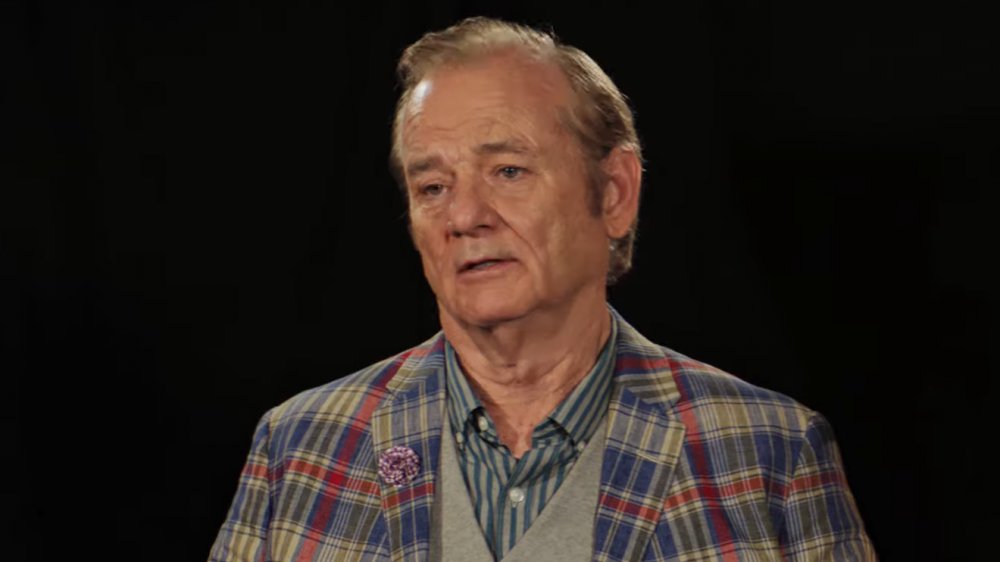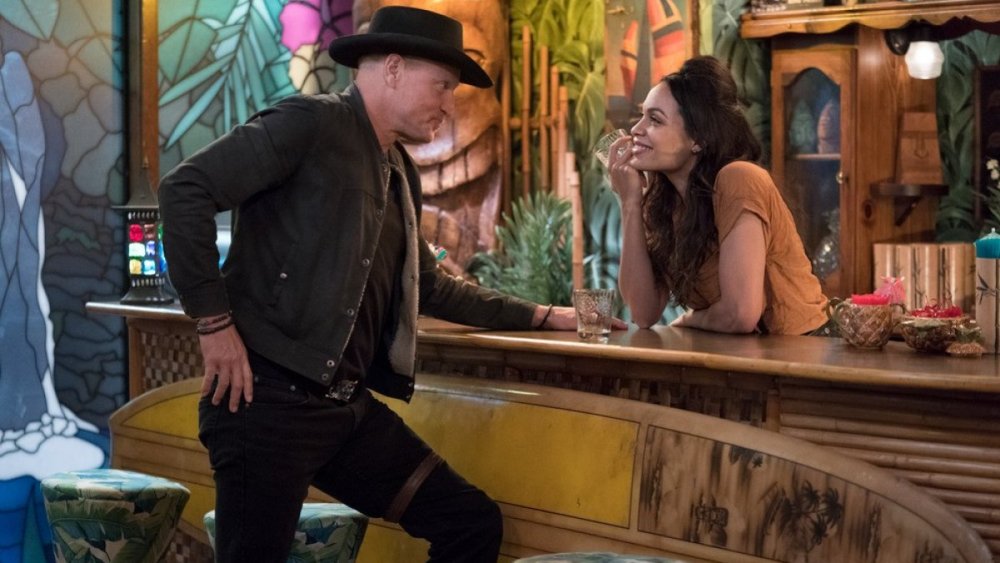5 Best And 5 Worst Things In Zombieland: Double Tap
A decade after 2009's Zombieland tore into theaters, we've finally got a sequel with the hilariously gruesome follow-up, Zombieland: Double Tap. Columbus (Jesse Eisenberg), Tallahassee (Woody Harrelson), Wichita (Emma Stone), and Little Rock (Abigail Breslin) are all back for the second installment in the apocalyptic franchise. While the first film followed an unlikely group of survivors on a road trip across the United States in the immediate aftermath of a cataclysmic zombie virus outbreak, the second picks up a few years later, after all the characters have settled a little more fully into their undead-tastic new normal... or so they think.
If you've seen Double Tap, you may already agree with the popular consensus that while the film is largely enjoyable, it falls slightly short of perfect. As with the first Zombieland, there are plenty of things to love about the sequel, but there are also a few things that didn't work as well as we might have hoped. Below, we sink our teeth into the five best and five worst things about Zombieland: Double Tap. Beware, for here there be zombie-sized spoilers.
Best: Madison
While there's really no weak link in the Zombieland cast, the MVP in Double Tap is quite possibly newcomer Zoey Deutch's Madison, who first encounters Columbus and Tallahassee in the shopping mall where she's been hiding in the Pinkberry freezer. Madison winds up tagging along on the group's quest to find the missing Little Rock, who's run off with a boy her own age, and the fizzy energy she brings to the group makes every scene she's in sparkle like it's lit with rainbows. Her bubbly optimism is a refreshing and hilarious contrast to the sarcasm and sardonic wit of the core group, and it's impossible not to smile whenever she's onscreen, whether she's explaining why she's never turned off the freezer she's been living in (she couldn't find the off switch), or inadvertently inventing ridesharing (to the scoffs of Columbus and Wichita).
About halfway through the film, it appears that Madison dies tragically after supposedly getting bitten by a zombie through her ridiculously impractical stiletto boot. However, in a delightful turn of events, she reappears out of nowhere in the final act — driving, appropriately, a technicolor ice cream truck — giddy to report that what we all assumed was a zombie virus infection was actually just a bad nut allergy (nuts in trail mix — who knew?). It's a twist that would feel forced and unearned if it was anyone else, but with Madison, somehow, it works, and we're grateful.
Worst: Berkeley
After ten years stuck with her sister, her sister's boyfriend, and a rough-around-the-edges wannabe cowboy who fancies himself her father figure, Little Rock (who was only 12 in the first film) spends the beginning of Double Tap metaphorically throwing herself against the walls of her self-imposed prison, yearning for contact with other people her own age, preferably of the attractive male variety. While Tallahassee shrugs off Little Rock's need for socialization outside their makeshift family, she shows just how serious she is when she takes off with the guitar-playing, weed-smoking Berkeley (Avan Jogia).
Although Tallahassee's screaming overreaction to learning that Berkeley is a pacifist is a bit much, we've got to agree with him that the guy's pretty insufferable. Not only does he shrug off Little Rock's interests and insist that his ideas are better, but he also flat-out lies to her in order to make himself look better, claiming to have composed Bob Dylan's "Like a Rolling Stone" and Lynyrd Skynyrd's "Free Bird." Plus, while his commitment to pacifism in the face of a zombie apocalypse may be admirable if you look at it under the right light, taking Little Rock to a place where they melt down their guns into peace symbol pendants, leaving their inhabitants defenseless, seems reckless at best, and downright deadly at worst.
Best: Rules vs. Commandments
The extended, unexplained doppelgänger sequence in Zombieland: Double Tap is a bit of a mixed bag — and not just because they cast Thomas Middleditch as the double for Jesse Eisenberg in a world where Michael Cera exists — but it's all worth it for the scene in which Columbus and Flagstaff realize that they each keep their own list of rules (or in Flagstaff's case, "commandments") for surviving in a zombie-filled world, and start comparing notes.
In the same manic, eminently polite way, they each start rattling off rules and numbers, each quick to point out when they each thought of the same thing, and kicking themselves when the other has a rule they should've included, such as Flagstaff's first commandment, "Teamwork." (Columbus' first rule, "cardio," is in fact on Flagstaff's list as well, but not until the mid-20s.) Although it doesn't do much to advance the overall plot of the film, Eisenberg and Middleditch each bring an earnest eagerness to the scene that makes the rapid-fire recitation of rules and the exceedingly cordial one-upmanship a joy to watch.
Worst: Tallahassee's Blackfoot heritage
Right before Columbus meets Madison in the mall early in the movie, Tallahassee decides to reveal a secret he's never told anyone before: somewhere in his family line, he has ties to the Blackfoot tribe. There's no real reason that Tallahassee brings this up — he must've just felt like sharing – and the information never really comes into play within the film's plot, except as a punchline.
Although it's definitely plausible that Tallahassee is telling the truth about his distant Blackfoot heritage, the way he talks after revealing it is cringe-inducing, as he refers to the others in his group as "palefaces" and claims a culture and marginalization he's clearly never experienced. While Tallahassee functions as a constant fountain of one-liners and no topic is off-limits when it comes to his trademark zingers, leaning on his supposed ethnic background as joke fodder feels cheap, exploitative, and unnecessary. What's more, Double Tap doesn't need those jokes — they're far from the funniest lines in the film, and the finished product wouldn't have suffered at all from taking them out.
Best: Tallahassee's big leap
At the end of the film, when our core group of heroes find themselves up against a horde of ravenous zombies and without any firearms, they have to get creative. Babylon doesn't have any guns or other weapons to speak of, but they do have an incredibly tall tower with a constant party raving on the rooftop. After their other plans to take out the zombies work, but just don't work enough, Columbus, Wichita, Little Rock, and the newly minted addition to the group, Nevada (Rosario Dawson) race up the stairs of the tower, while Tallahassee brings up the rear, slowing the pursuing zombies in any way he can, including rolling barrels down the stairs, Donkey Kong style.
Once Tallahassee reaches the top, the reason why he was delaying the zombies becomes evident — on the roof, his family and the inhabitants of Babylon have created a makeshift corridor out of bits of chainlink fence and corrugated steel, funneling the zombies along a path that leads off the edge of the roof. Tallahassee leads the charge, and for a moment, it seems as though he's going to sacrifice himself in order to guide them all over the edge like bloodthirsty undead lemmings. But at the last second, he jumps and grabs onto a large dangling hook, and is ultimately pulled to safety. It's a thrilling, moving scene, and one of Tallahassee's most heroic moments, and the relief when he manages to come through it unscathed is immense.
Worst: Babylon
Let's be clear, it's not as though the idea of an idyllic, peaceful community in the midst of a world full of blood and death and chaos is unappealing. We can see the draw of Babylon, and why characters like Berkeley, Little Rock, Madison, and even Columbus would be tempted to stay. But at the same time, there is a zombie apocalypse going on, and it's not like that's a new thing; it's been going on for ten years, and the zombies are only becoming more plentiful, plus they're evolving like viruses into more resilient versions of themselves. The time for denial is far, far in the past.
So it's just that much more infuriating when the people of Babylon seem to completely ignore the reality of the world they live in, and don't even consider the possibility that perhaps playing loud music and shooting off fireworks at all hours of the night might someday draw the attention of the undead. And while Babylon's "no guns" rule makes sense inside the compound, the fact that they actually melt down the weapons of anyone who comes in, as opposed to keeping them locked up in a safe place, just in case, seems ludicrous. Then, when the zombies inevitably arrive, the people of Babylon still don't seem to realize there's a threat, making us wonder how on earth this place has managed to stand for ten years. Maybe they've just been throwing peace pendants at the zombies all this time.
Best: The zombie battles
As with the first Zombieland, one of the most enjoyable elements of Double Tap is in its epic and creative (and often slow-motion) showdowns between humans and zombies. The first smackdown plays out over the opening credits, as Zombieland's core foursome takes out the pack of zombies blocking their path to the White House, and it's a great way to reintroduce the film's main characters after ten years away. Later, when Flagstaff and Albuquerque (Luke Wilson) become infected in the Hound Dog Hotel, the frantic fight through the hallways is a thing of beauty.
But probably the best battle comes at the end of the film, as Tallahassee, Columbus, Wichita, and Little Rock execute their plan to blow up the incoming zombies, then make a valiant effort to hold them off in hand-to-hand combat, and finally, when all seems lost, Nevada comes roaring in driving Albuquerque's monster truck, "Big Fat Death." The group piles into the oversized vehicle, and Nevada swerves all over the Babylon compound like a pro, crushing dozens upon dozens of zombies under Big Fat Death's enormous tires. That Columbus is in the back seat getting increasingly, comically carsick the longer the scene goes on is just icing on the cake.
Worst: Inconsistent T-800 zombies
Fairly early on in Double Tap, the characters get wind that there's a new kind of zombie out there — one that's faster, smarter, more determined, and harder to kill than any of the others they've fought. The first time we meet one of these evolved super-zombies, Columbus dubs it the T-800 (referencing the Terminator movies) based on its dogged perseverance and how hard it is to kill. Indeed, Tallahassee is forced to go far beyond the double tap in order to put the first T-800 zombie down, unloading nine bullets into its undead body and then crushing its skull under his boot before it finally stops trying to eat him.
Later in the film, the T-800s have suddenly become much easier to kill. Yes, they're still deadly and intimidating, but most of the reason they're so daunting has more to do with sheer numbers than individual fortitude. By the end of the film, characters are easily taking out T-800s with a single blow from a shovel, which seems significantly less severe than nine gunshot wounds. If Double Tap was going to introduce a new strain of super-zombies, it would've been nice for it to have had more of an effect on how the characters had to fight them. As it is, the entire final battle in Babylon could've easily taken place with a horde of regular zombies, rendering the introduction of the T-800s fairly pointless.
Best: Bill Murray
One of the best parts of the original Zombieland is Ghostbusters actor Bill Murray's extended cameo as a version of himself, where he'd managed to survive the first wave of the zombie apocalypse by pretending to be a zombie, using makeup and his acting skills. Unfortunately, Columbus doesn't realize that Murray is only pretending, and shoots the actor dead in his Hollywood mansion. In Double Tap, we find out that, ten years later, mistakenly killing a human that you thought was a zombie is called "Murraying."
Since Columbus killed Bill Murray in the first Zombieland, we hadn't held out a lot of hope of seeing him again in the sequel, but the actor does actually pop up — twice! — during the end credits. Both scenes take place during the 2009 press junket for the (thankfully) fictional Garfield 3, which it turns out coincided with the beginning of the zombie virus outbreak. The first person to be affected is Today Show host Al Roker, one of the many reporters interviewing Murray and asking him to pretend to cough up a hairball, who begins vomiting and becoming aggressive. Murray takes matters into his own hands, walking calmly out of the interview tent and expertly taking out one zombie after another armed with nothing but a metal folding chair — and even drops a couple of his most iconic lines along the way. Then, as if that scene wasn't enough of an unexpected gift, at the end of the credits, we see him shortly before the zombie activity started, obligingly performing the hairball noise in what he claims are a variety of different accents.
Worst: Logic
We're willing to suspend a lot of disbelief for the Zombieland movies, but in a film that's supposed to be set a decade into a zombie apocalypse, there are a few things that are a little hard to swallow. We can accept Columbus' explanation that the reason why every building the characters enter still has electricity is because of rainwater continually filling the dams at hydroelectric power plants, but there's still quite a bit that rainwater and dams can't explain. In the first film, most of our issues could be handwaved away because of the time period — the zombie apocalypse had only been going on for a short time, so of course the characters would have a relatively easy time finding food, clothing, fuel, clean water, and other resources.
After ten years, though, some things should be a little harder to come by. Even putting aside the issue of how the characters have been getting food for the past decade — although we have some serious questions about those bowls of olives and maraschino cherries that Nevada had out on the bar in the Hound Dog — we wonder about other finite resources, such as gasoline and bullets. Conservation doesn't appear to be a concern for any of them as they drive cross-country in giant gas-guzzlers and fire their guns indiscriminately at zombies. While we're not asking for the gritty grimness of The Walking Dead — which is "totally unrealistic," according to Columbus — at least a little acknowledgement that the modern infrastructure that provides things like food, fuel, and utilities doesn't exist anymore would've been appreciated.
